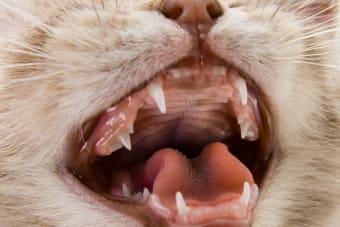Welcoming a kitten into your home is an exciting adventure filled with playful antics and heartwarming moments. However, along with the joy of new companionship comes a natural process that every kitten must face: teething. Just like human babies, kittens go through a teething stage that can bring about a mix of discomfort, curiosity, and even a few surprises. Understanding when and how kittens teeth is essential for ensuring they remain healthy and happy during this time.
In this article, we’ll explore the teething timeline for kittens, the signs you can expect to see, and tips on how to help your furry friend navigate this transitional phase with ease. So, let’s dive into the fascinating world of kitten teething and ensure your little one’s experience is as smooth as possible!
Table of Contents
- Understanding the Teething Timeline for Kittens
- Signs to Look For: Identifying Teething Symptoms in Your Kitten
- Tips for Easing Discomfort: Helping Your Kitten Through the Teething Phase
- Choosing Safe Chew Toys: The Best Options for Teething Kittens
- Q&A
- In Conclusion
Understanding the Teething Timeline for Kittens
The teething process for kittens typically begins around three weeks of age and extends until they are about six months old. During this phase, they transition from their tiny, baby teeth to their adult set. This timeline involves several key stages:
- 3-4 weeks: Baby teeth start to emerge.
- 8 weeks: Kittens usually have a complete set of 26 baby teeth.
- 12-16 weeks: Adult teeth begin to push through, starting with the incisors.
- 6 months: Adult teeth fully replace baby teeth, totaling 30 in all.
During this period, you might notice your kitten engaging in some peculiar behaviors as they navigate discomfort and curiosity. Common signs include:
- Chewing: Increased chewing on toys, furniture, or even your fingers.
- Gum sensitivity: Swollen or bleeding gums may be visible.
- Changes in appetite: A temporary reluctance to eat if they are in pain.
It’s essential to provide appropriate items for your kitten to chew on, like soft toys or teething rings, to alleviate discomfort and steer them away from destructive chewing habits. Keeping an eye on their progress will ensure a smoother transition into adulthood.
Signs to Look For: Identifying Teething Symptoms in Your Kitten
Teething can be a challenging time for both kittens and their owners, and recognizing the signs early can help you support your furry friend through this phase. Keep an eye out for excessive chewing on toys, furniture, or even your fingers; this is their natural instinct as they seek relief from the discomfort of emerging teeth. Other common symptoms include increased irritability or restlessness, as well as a tendency to hide more than usual, all of which can indicate that your kitten is feeling the pressure of teething.
Physical signs can also provide clues that your kitten is teething. Look for swollen or red gums, and if you’re comfortable, gently lift their lip to inspect their mouth. You may also notice a few lost baby teeth around the house, which is perfectly normal! Be vigilant about their eating habits; if they suddenly seem less interested in food, it could be due to sore gums. Here’s a handy table summarizing the key symptoms of teething in kittens:
| Symptom | Description |
|---|---|
| Excessive Chewing | Increased desire to chew on various objects. |
| Gum Swelling | Inflamed or red gums are common during teething. |
| Changes in Appetite | May show less interest in food due to discomfort. |
| Irritability | May become cranky or moody. |
Tips for Easing Discomfort: Helping Your Kitten Through the Teething Phase
During the teething phase, your kitten may experience discomfort and sore gums, which can lead to increased chewing on various objects. To help mitigate this discomfort, consider providing your furry friend with specific chew toys designed for teething. Look for options made from soft rubber or fabric that are gentle on their gums. Additionally, you can offer frozen or chilled items, like a wet washcloth or specialized dental chews. These not only soothe sore gums but also help to distract your kitten from the urge to chew on furniture or personal belongings.
It’s important to remain attentive to your kitten’s behavior during this phase. Keep an eye out for signs of distress, such as excessive drooling or changes in eating habits. If your kitten seems particularly uncomfortable, consult a veterinarian who may suggest safe pain relief options. Providing a cozy, quiet space for your kitten to relax can also be beneficial. Creating a comforting environment helps ensure that they feel secure while navigating this transitional period. Remember, patience and love go a long way in helping your little one through their teething journey!
Choosing Safe Chew Toys: The Best Options for Teething Kittens
As your kitten embarks on their teething journey, selecting the right chew toy is essential for both their comfort and safety. Kittens typically begin teething around 3 to 4 months of age, and providing them with appropriate toys can help alleviate some of the discomfort associated with this natural process. Look for toys that are soft yet durable, as overly hard materials can risk damaging their delicate teeth. It’s also important to choose toys that are non-toxic and free from small parts that could pose a choking hazard. Here are some excellent options to consider:
- Rubber Chew Toys: Flexible and gentle on gums.
- Fabric Mice or Balls: Soft textures that encourage gentle chewing.
- Teething Rings: Designed specifically for teething kittens.
- Frozen Treats: Safe, chewy options that can soothe sore gums.
Always supervise your kitten during playtime to ensure they are using their chew toys safely. If you’re unsure which toys are best, consult your veterinarian for recommendations tailored to your kitten’s needs. Regularly inspect the toys for signs of wear and tear, as damaged toys can present risks. Here’s a helpful comparison of some popular teething toy materials, highlighting their benefits:
| Material | Benefits |
|---|---|
| Rubber | Durable, easy to clean, non-toxic |
| Fabric | Soft, comforting, can be infused with catnip |
| Wood | Natural, promotes dental health, chew-friendly |
| Plastic | Lightweight, versatile shapes, often brightly colored |
Q&A
Q&A:
Q1: At what age do kittens start teething?
A: Kittens typically begin teething around three to four months of age. During this time, they will start to lose their deciduous (baby) teeth, making way for their permanent adult teeth.
Q2: What are the signs that my kitten is teething?
A: You may notice several signs indicating your kitten is teething. These can include excessive chewing or gnawing on toys or furniture, increased drooling, irritability, and sometimes even pawing at their mouth. Your kitten might be more playful or fidgety as they seek relief from the discomfort.
Q3: How long does the teething process last?
A: The teething process generally lasts from about three to six months. By six months, most kittens will have completed the transition to their adult teeth. However, individual kittens may vary, and some may take a little longer.
Q4: Should I be worried if my kitten is losing teeth?
A: It’s completely normal for kittens to lose their baby teeth as they grow. However, if you notice any excessive bleeding, swollen gums, or if your kitten seems to be in severe pain, it’s a good idea to consult your veterinarian to rule out any potential issues.
Q5: What can I do to help my kitten during this stage?
A: Providing appropriate toys for chewing can help soothe your kitten’s gums. Look for soft rubber toys or dental chews that are specifically designed for kittens. Additionally, you can offer cold items, such as a damp washcloth that has been chilled in the refrigerator, to provide extra relief.
Q6: Can teething affect my kitten’s eating habits?
A: Yes, teething can cause some kittens to be less interested in eating, especially if their gums are sore. If your kitten seems to be eating less than usual, try offering softer food or moistened kibble until they are more comfortable.
Q7: Is there anything I should avoid giving my kitten during this time?
A: Avoid giving your kitten hard objects that might break their teeth, such as bones or very hard chew toys. It’s important to choose items that are designed for teething to prevent any injury or dental issues.
Q8: When should I schedule a vet visit regarding my kitten’s teeth?
A: It’s a good idea to schedule a vet visit around six months of age for a general check-up, which should include an examination of your kitten’s teeth. If you notice persistent problems, such as swollen gums or continual reluctance to eat, do not hesitate to reach out to your veterinarian sooner.
Q9: How can I encourage good dental hygiene for my kitten?
A: Start by offering chew toys that promote dental health and introducing them to brushing their teeth as they grow. There are also dental treats available that can help reduce plaque and keep their teeth healthy. Regular vet check-ups will also play a crucial role in maintaining your kitten’s dental health.
Q10: Will my kitten’s behavior return to normal after teething?
A: Yes! Once your kitten has completed the teething process and their adult teeth have fully emerged, you should see a return to their usual behavior. They’ll be more comfortable and able to enjoy their playtime and meals without discomfort.
If you have any further questions or concerns about your kitten’s teething process, don’t hesitate to consult your veterinarian for personalized advice. Happy kitten parenting!
In Conclusion
As your little furball navigates the teething stage, it’s important to remember that patience and understanding will go a long way. Every kitten is unique, and while some may breeze through this phase, others might need a bit more support and comfort. Ensuring they have appropriate toys to chew on, maintaining a calm environment, and offering plenty of love will help ease any discomfort they may experience. By being attentive to their needs and recognizing the signs of teething, you’ll not only help your kitten through this natural process but also strengthen the bond between you two. After all, these early months are just the beginning of a beautiful adventure together! If you have any questions or concerns about your kitten’s teething journey, don’t hesitate to reach out to your veterinarian for guidance. Happy cuddling!
















